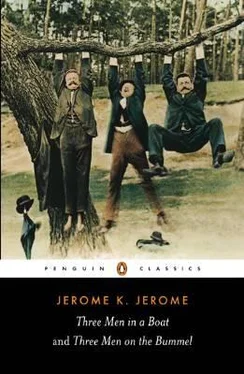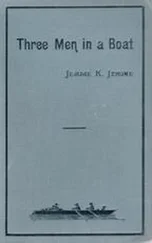Jerome Jerome - Three Men on the Bummel
Здесь есть возможность читать онлайн «Jerome Jerome - Three Men on the Bummel» весь текст электронной книги совершенно бесплатно (целиком полную версию без сокращений). В некоторых случаях можно слушать аудио, скачать через торрент в формате fb2 и присутствует краткое содержание. Жанр: Юмористическая проза, на английском языке. Описание произведения, (предисловие) а так же отзывы посетителей доступны на портале библиотеки ЛибКат.
- Название:Three Men on the Bummel
- Автор:
- Жанр:
- Год:неизвестен
- ISBN:нет данных
- Рейтинг книги:4 / 5. Голосов: 1
-
Избранное:Добавить в избранное
- Отзывы:
-
Ваша оценка:
- 80
- 1
- 2
- 3
- 4
- 5
Three Men on the Bummel: краткое содержание, описание и аннотация
Предлагаем к чтению аннотацию, описание, краткое содержание или предисловие (зависит от того, что написал сам автор книги «Three Men on the Bummel»). Если вы не нашли необходимую информацию о книге — напишите в комментариях, мы постараемся отыскать её.
Three Men on the Bummel — читать онлайн бесплатно полную книгу (весь текст) целиком
Ниже представлен текст книги, разбитый по страницам. Система сохранения места последней прочитанной страницы, позволяет с удобством читать онлайн бесплатно книгу «Three Men on the Bummel», без необходимости каждый раз заново искать на чём Вы остановились. Поставьте закладку, и сможете в любой момент перейти на страницу, на которой закончили чтение.
Интервал:
Закладка:
As for the hen it scuttled, screaming, every way at once. It was a marvellous bird: it seemed to be able to run up a straight wall quite easily; and it and the cat between them fetched down mostly everything that was not already on the floor. In less than forty seconds there were nine people in that room, all trying to kick one dog. Possibly, now and again, one or another may have succeeded, for occasionally the dog would stop barking in order to howl. But it did not discourage him. Everything has to be paid for, he evidently argued, even a pig and chicken hunt; and, on the whole, the game was worth it.
Besides, he had the satisfaction of observing that, for every kick he received, most other living things in the room got two. As for the unfortunate pig-the stationary one, the one that still sat lamenting in the centre of the room-he must have averaged a steady four. Trying to kick this dog was like playing football with a ball that was never there-not when you went to kick it, but after you had started to kick it, and had gone too far to stop yourself, so that the kick had to go on in any case, your only hope being that your foot would find something or another solid to stop it, and so save you from sitting down on the floor noisily and completely. When anybody did kick the dog it was by pure accident, when they were not expecting to kick him; and, generally speaking, this took them so unawares that, after kicking him, they fell over him. And everybody, every half-minute, would be certain to fall over the pig the sitting pig, the one incapable of getting out of anybody's way.
How long the scrimmage might have lasted it is impossible to say. It was ended by the judgment of George. For a while he had been seeking to catch, not the dog but the remaining pig, the one still capable of activity. Cornering it at last, he persuaded it to cease running round and round the room, and instead to take a spin outside. It shot through the door with one long wail.
We always desire the thing we have not. One pig, a chicken, nine people, and a cat, were as nothing in that dog's opinion compared with the quarry that was disappearing. Unwisely, he darted after it, and George closed the door upon him and shot the bolt.
Then the landlord stood up, and surveyed all the things that were lying on the floor.
"That's a playful dog of yours," said he to the man who had come in with the brick.
"He is not my dog," replied the man sullenly.
"Whose dog is it then?" said the landlord.
"I don't know whose dog it is," answered the man.
"That won't do for me, you know," said the landlord, picking up a picture of the German Emperor, and wiping beer from it with his sleeve.
"I know it won't," replied the man; "I never expected it would. I'm tired of telling people it isn't my dog. They none of them believe me."
"What do you want to go about with him for, if he's not your dog?" said the landlord. "What's the attraction about him?"
"I don't go about with him," replied the man; "he goes about with me. He picked me up this morning at ten o'clock, and he won't leave me. I thought I had got rid of him when I came in here. I left him busy killing a duck more than a quarter of an hour away. I'll have to pay for that, I expect, on my way back."
"Have you tried throwing stones at him?" asked Harris.
"Have I tried throwing stones at him!" replied the man, contemptuously. "I've been throwing stones at him till my arm aches with throwing stones; and he thinks it's a game, and brings them back to me. I've been carrying this beastly brick about with me for over an hour, in the hope of being able to drown him, but he never comes near enough for me to get hold of him. He just sits six inches out of reach with his mouth open, and looks at me."
"It's the funniest story I've heard for a long while," said the landlord.
"Glad it amuses somebody," said the man.
We left him helping the landlord to pick up the broken things, and went our way. A dozen yards outside the door the faithful animal was waiting for his friend. He looked tired, but contented. He was evidently a dog of strange and sudden fancies, and we feared for the moment lest he might take a liking to us. But he let us pass with indifference. His loyalty to this unresponsive man was touching; and we made no attempt to undermine it.
Having completed to our satisfaction the Black Forest, we journeyed on our wheels through Alt Breisach and Colmar to Munster; whence we started a short exploration of the Vosges range, where, according to the present German Emperor, humanity stops. Of old, Alt Breisach, a rocky fortress with the river now on one side of it and now on the other-for in its inexperienced youth the Rhine never seems to have been quite sure of its way,-must, as a place of residence, have appealed exclusively to the lover of change and excitement. Whoever the war was between, and whatever it was about, Alt Breisach was bound to be in it. Everybody besieged it, most people captured it; the majority of them lost it again; nobody seemed able to keep it. Whom he belonged to, and what he was, the dweller in Alt Breisach could never have been quite sure. One day he would be a Frenchman, and then before he could learn enough French to pay his taxes he would be an Austrian. While trying to discover what you did in order to be a good Austrian, he would find he was no longer an Austrian, but a German, though what particular German out of the dozen must always have been doubtful to him. One day he would discover that he was a Catholic, the next an ardent Protestant. The only thing that could have given any stability to his existence must have been the monotonous necessity of paying heavily for the privilege of being whatever for the moment he was. But when one begins to think of these things one finds oneself wondering why anybody in the Middle Ages, except kings and tax collectors, ever took the trouble to live at all.
For variety and beauty, the Vosges will not compare with the hills of the Schwarzwald. The advantage about them from the tourist's point of view is their superior poverty. The Vosges peasant has not the unromantic air of contented prosperity that spoils his vis— a-vis across the Rhine. The villages and farms possess more the charm of decay. Another point wherein the Vosges district excels is its ruins. Many of its numerous castles are perched where you might think only eagles would care to build. In others, commenced by the Romans and finished by the Troubadours, covering acres with the maze of their still standing walls, one may wander for hours.
The fruiterer and greengrocer is a person unknown in the Vosges. Most things of that kind grow wild, and are to be had for the picking. It is difficult to keep to any programme when walking through the Vosges, the temptation on a hot day to stop and eat fruit generally being too strong for resistance. Raspberries, the most delicious I have ever tasted, wild strawberries, currants, and gooseberries, grow upon the hill-sides as black-berries by English lanes. The Vosges small boy is not called upon to rob an orchard; he can make himself ill without sin. Orchards exist in the Vosges mountains in plenty; but to trespass into one for the purpose of stealing fruit would be as foolish as for a fish to try and get into a swimming bath without paying. Still, of course, mistakes do occur.
One afternoon in the course of a climb we emerged upon a plateau, where we lingered perhaps too long, eating more fruit than may have been good for us; it was so plentiful around us, so varied. We commenced with a few late strawberries, and from those we passed to raspberries. Then Harris found a greengage-tree with some early fruit upon it, just perfect.
"This is about the best thing we have struck," said George; "we had better make the most of this." Which was good advice, on the face of it.
Читать дальшеИнтервал:
Закладка:
Похожие книги на «Three Men on the Bummel»
Представляем Вашему вниманию похожие книги на «Three Men on the Bummel» списком для выбора. Мы отобрали схожую по названию и смыслу литературу в надежде предоставить читателям больше вариантов отыскать новые, интересные, ещё непрочитанные произведения.
Обсуждение, отзывы о книге «Three Men on the Bummel» и просто собственные мнения читателей. Оставьте ваши комментарии, напишите, что Вы думаете о произведении, его смысле или главных героях. Укажите что конкретно понравилось, а что нет, и почему Вы так считаете.










